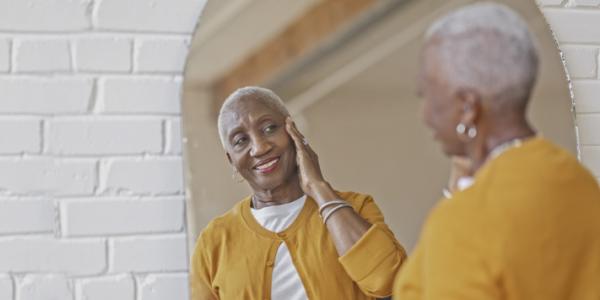
Your skin is your largest organ and should be cared for at every age. Not only does skin protect your body, but it can also be an important indicator of your overall health. Utilize these helpful tips to get the most out of your skincare, especially in your later years.
As you age, your skin changes; often becoming drier and more sensitive to temperature, weather and topical ingredients. But skincare encompasses more than just washing your face or applying lotion.
Skip
Sun protection
The majority of damage to your skin comes from the sun. The older you get, the more sensitive your skin becomes to the sun. Prolonged, unprotected exposure to the sun can cause sunspots, wrinkles, discoloration and more. But even decades of cumulative damage doesn't mean you're doomed — there are easy ways to protect your skin:
- Wear long sleeves when you go outside.
- Wear sunscreen with at least 30 SPF.
- Wear a hat and gloves if you participate in outdoor activities like gardening.
- Gravitate to the shade
Skincare products
Along with greater sensitivity to the sun, your skin can also become easily irritated by fragrances, ingredients and chemicals (such as retinol) found in lotions, creams and soaps, and can increase skin sensitivity to the sun. Avoid fragrant soaps and lotions and instead opt for fragrance-free products. Limit how much perfume or cologne you use and avoid direct contact to the skin. When in doubt, choose gentler products.
Reevaluate the type of detergent, hand soap and even dish soap you use. Use gloves and gentle dish soap when you wash dishes to avoid any irritation. Use a non-fragrant (perhaps hypoallergenic) laundry detergent.
Skincare routine
Aside from using gentler products, consider what other aspects of your routine can change to improve your overall skin health:
- Later in life, your skin can become less sensitive to higher temperatures, so be cautious when taking a shower or drawing a bath to use warm water, rather than hot water.
- Pat the skin after you get out of the shower rather than rubbing.
- Apply a gentle moisturizer to the skin soon after bathing.
- Avoid loofahs or harsh scrubbers and use soft washing cloths.
Check with your dermatologist and doctor before making any major changes to your skincare. Make sure to regularly perform a self-examination for spots and lesions that may appear problematic. When caught early enough, cancerous lesions can generally be treated and removed. El Camino Health offers comprehensive services specifically for older adults, including preventive care, annual checkups, chronic disease management and more. If you don’t currently have a dermatologist, search for a doctor near you.
This article first appeared in the January 2022 edition of the HealthPerks newsletter.

